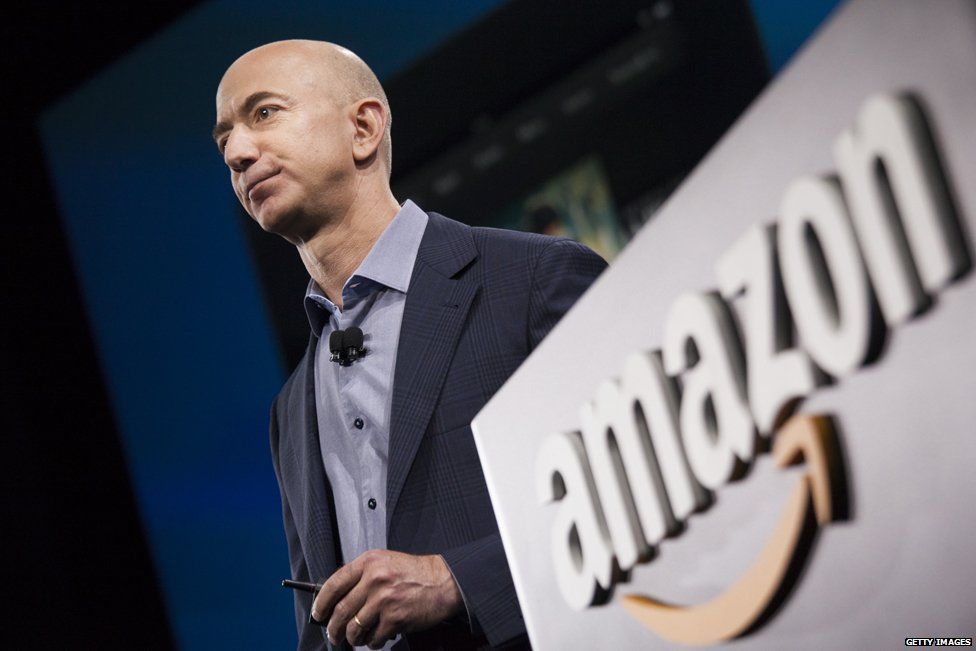

Amazon’s profitless path
-
15 July 2015
- From the section Technology
- comments

Twenty years ago today Amazon sold its first book, created the first online book store and went on to become a hugely profitable internet superpower. Today it’s celebrating that anniversary with Amazon Prime day, 24 hours of special offers which will be the biggest day of e-commerce the world has ever seen.
Actually, scrub that first paragraph – almost every fact in it is inaccurate. That birthday? Three months earlier Amazon had already tested its systems, selling an academic work about artificial intelligence to a computer scientist in April 1995. It was not the first online book store – the previous year a British man, Darryl Mattocks, posted the first book sold by his Internet Bookshop, a venture soon eclipsed by Amazon.
Amazon Prime day is a clever piece of marketing – but won’t be on the scale of Black Friday or China’s Singles Day. It is also unlikely to give a big boost to the online retailer’s bottom line – and there we come to the biggest falsehood in my opening paragraph. Amazon is certainly an internet superpower, but it is most definitely not “hugely profitable”.
In fact, its story is one of a brazen contempt for what you might regard as the first rule of capitalism – the duty of a public company to maximise profits for its shareholders. Throughout its history, Amazon has seen its revenues climb inexorably while its profits hover around or below zero.
Last year its revenues hit $88bn (£56bn) , but it made a loss of $240m (£153m). (Just as a comparison, Tesco’s revenues in 2014 were £71bn, on which it made a profit of £2.6bn – though this year it recorded a huge loss after writing down the value of its property. Oh, and right now the stock market thinks Amazon is worth roughly eight Tescos.)
It is not that Amazon has not made money – from selling books, then all sorts of other goods, then acting as a platform for all kinds of other businesses to sell their products. It is just that it has relentlessly ploughed that cash back into capital expenditure, mostly aimed at improving the delivery infrastructure at the heart of its business.
That means that it has been able to satisfy consumer desires ever more quickly. There is now even an Amazon button you can press every time you run out of household staples and then get them delivered without going near a computer or phone. Another innovation, the Echo speaker, will obey your every command, serving up digital media as well as taking orders for physical goods. And then there is the plan to deliver parcels by drone – a madcap idea which nevertheless speaks volumes about the company’s ruthless focus on speedy service.
Better, faster service means shoppers gravitate to Amazon in whichever market it enters, generating more revenue which can in turn be ploughed into new conquests rather than returned to shareholders. In recent years, more of that cash has gone into a whole new business, Amazon’s cloud computing service AWS. It is now generating substantial revenues – and to the surprise of many, turns out to be profitable, though again the surplus is likely to be directed towards further growth.
Investors now seem to accept this constant diet of jam tomorrow, which somehow never arrives. But in his company’s first decade, Amazon’s founder Jeff Bezos had to defy the market, refusing to change course when the word on Wall Street was that the business was heading for bankruptcy.
He must now rank alongside the likes of Bill Gates and Steve Jobs, not just in longevity but in a steely determination to pursue his vision, no matter what critics or the conventional wisdom may say. The man with a braying laugh which threatens to shatter glasses has more easygoing charm than many of his peers in the technology world, but he does not seem to mind making enemies.
In recent years, those have included British bookshops and taxpayers. Independent bookstores have begun sporting signs boasting that the tax they pay supports the salaries of NHS workers, with the implication being that the giant which dominates their trade is not so generous.
Last year Amazon paid just £11.9m in tax while booking £5.3bn in revenue from the UK through its Luxembourg subsidiary. Of course, companies pay tax on profits not revenues and, here as elsewhere, what meagre profits there are seem to evaporate like the morning mist.
But despite talk of consumer boycotts and clever ideas like a web tool which allows you to browse on Amazon but buy in independent bookstores, there seem to be few threats to the Seattle-based giant’s inexorable expansion. Even the competition regulators seem quiet – indeed Amazon was the big winner when the US found Apple and publishers had conspired to push up digital book prices.
Yes, not everything Amazon touches turns to gold – its Fire Phone has made no impact on the market, and the Prime Instant Video service is engaged in a hard and costly battle with Netflix. But Jeff Bezos’s original vision – the Everything Store as it was described in a history of the firm – has been realised in spades. It is hard to imagine that Amazon will not be a force in our lives 20 years from now – and who knows, it may even be making big profits and paying lots of tax.


